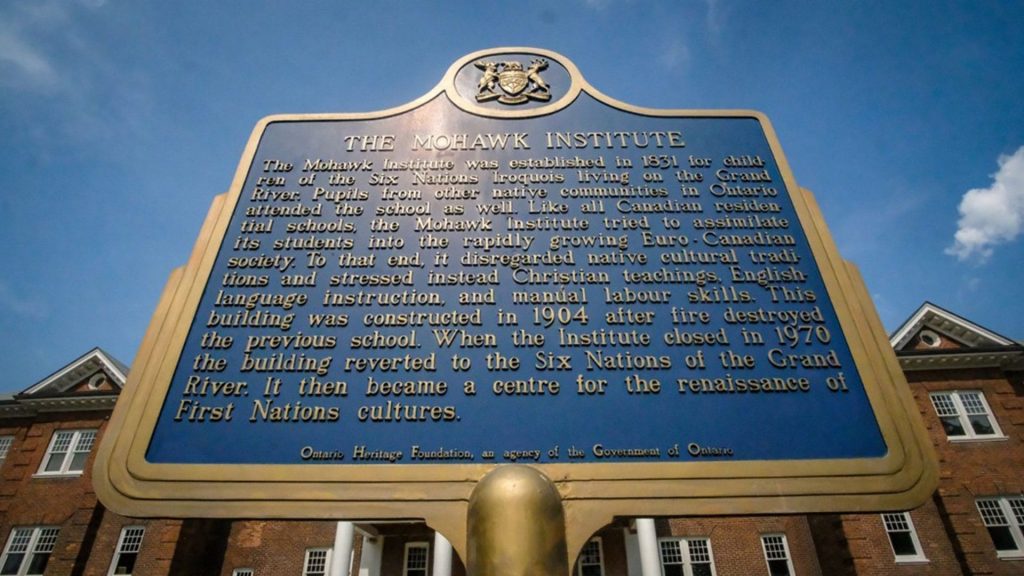
The Mohawk Institute, known as the Mush Hole because of the food, ran for 85 years between 1885 and 1970. Photo: APTN
Police on Six Nations of the Grand River territory say a probe will be launched into child deaths and unmarked burials at the former Mohawk Institute Residential School in Brantford, Ont.
The institute, located a short distance off the territory, was the first and longest-running residential school in the country. Pupils dubbed it the Mush Hole due to the poor quality of the food.
Six Nations police said Wednesday they formally requested assistance from Ontario Provincial Police (OPP) and Brantford municipal police. This followed a press conference last week on the steps of the former institute, now the Woodland Cultural Centre, in which survivors urged police to open a criminal investigation in a letter read to media.
“The letter outlines how the students of the school were subjected to mental, physical, and sexual abuse. The letter also alleges that some students disappeared, were never seen again, and that many died while at the school,” Six Nations police said.
“The survivors felt that some staff may be responsible for the deaths of the students. It is also mentioned in the letter that human child bones were found on the grounds in and around 1983 and reburied in an unmarked grave, somewhere on the property.”
The release said public records document 54 deaths at the institute. These victims’ final resting places are unknown, police said. The force added that due to the “scope and magnitude” of the investigation, currently in the planning stages, they will need help.
An OPP spokesperson confirmed the force received a letter on July 23 from Six nations police Chief Darren Montour requesting investigative assistance into abuse and deaths as well as locating victims’ unmarked graves.
“The OPP will be meeting with the Six Nations Police Service and Brantford Police to determine the next steps forward, including the potential assignment of an OPP Case Manager,” said Bill Dickson via email.
Read more:
Demands for independent investigations have been growing following confirmation of unmarked graves at residential schools in British Columbia and Saskatchewan.
Six Nations elected Chief Mark Hill has been unsuccessfully demanding cash from Canada and Ontario to search the grounds. He joined the survivors last week and criticized Prime Minister Justin Trudeau, who didn’t visit the institute site while touring Hamilton less than an hour away the previous day.
The institute ran as a residential school for 85 years between 1885 and 1970. It first began taking on boarders in 1834 as a mission school. It was run by the Anglican Church.
The institute had two prison cells that served as punishment rooms for truants, who were often tracked down by Mounties, according to the Truth and Reconciliation Commission.
An inspector reported in 1907 that he came away unimpressed “with the sight of two prison cells in the boys [sic] play house. I was informed, however, that these were for pupils who ran away from the institution, confinement being for a week at a time when pupils returned,” the TRC said.
The institute was targeted by an Indian Affairs probe in the ’40s after the Brantford Women’s Council alleged students lacked adequate clothing and education materials. The council issued a report raising flags while demanding better funding and an immediate investigation, according to public archives.
The institute was cleared.
“Considerable criticism has been made against this institution, but in our opinion, we did not find any evidence to warrant such criticism,” said a judge in newspaper clippings from March 1946 held by Library and Archives Canada.
The Canadian government estimates about 150,000 Indigenous children were forced to attend residential schools. They were church run but government funded until Ottawa took them over in 1969 under prime minister Pierre Trudeau and Indian Affairs minister Jean Chrétien.
The last school closed its doors in 1996.
The Indian Residential Schools Resolution Health Support Program has a hotline to help residential school survivors and their relatives suffering with trauma invoked by the recall of past abuse. The number is 1-866-925-4419.










